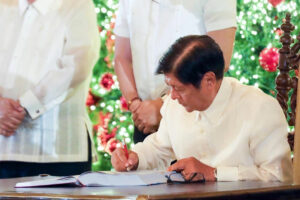THE GOVERNMENT’S 2025 spending plan may not support the administration’s social and economic priorities as “budget politics” continues to affect allocations, GlobalSource Partners said.
“These budget politics in the Philippines are no less than a zero-sum game,” GlobalSource Country Analysts Diwa C. Guinigundo and Wilhelmina C. Mañalac said in a report.
“Because in maintaining the favorite items of legislators for public works projects, there can only be so much left to be allocated to education, health and other key social amelioration projects possibly even transgressing the Constitution and the laws of the land,” they said.
On Dec. 30, President Ferdinand R. Marcos, Jr. signed the P6.326-trillion budget bill while vetoing P194 billion worth of line items. He also rejected P168.24 billion in “unprogrammed” spending items, which will go through only if the government finds sufficient revenue.
The budget gave the highest allocation of P1.055 trillion to education, followed by the Department of Public Works and Highways (DPWH) with P1.007 trillion.
The bicameral conference committee version of the bill gave the DPWH P1.1 trillion compared to P737-billion budget of the Department of Education (DepED), in violation of the constitution, which requires that education receive top priority in public spending.
“On the basis of President Marcos’ pronouncements on the budget, he vowed to restore the amounts slashed from the DepEd expenditure program. However, he seems to be convinced that the zero subsidy for Philippine Health Insurance Corp. (PhilHealth), should remain,” the opposition-affiliated 1 Sambayan pressure group said.
Mr. Guinigundo and Ms. Mañalac, noting that the subsidy reduction was justified by the health insurer’s P400 billion in reserve funds, called this reasoning “absurd” because the reserve funds are intended to cover any PhilHealth liabilities that may arise.
“Other civic organizations including the Makati Business Club also found objectionable the retention of the AKAP (Ayuda para sa Kapos ang Kita program) or the social amelioration fund,” they added, noting that these funds are prone to abuse.
“In the first place, if AKAP is for the poor and should be retained, several quarters are in a quandary why in the first place the health subsidy to PhilHealth was zeroed out when better coverage from the health insurance directly benefits the poor.”
The GlobalSource analysts said that with the reduction in infrastructure projects, it may look like the education sector will be receiving a slightly higher priority in compliance with the Constitution. However, PhilHealth’s zero subsidy puts the 2025 budget in violative of the Constitution and various laws.
“In the absence of a law on confidential and intelligence funds, appropriations for these items are also questionable. It is also obvious that the President decided not to touch the higher allocations to both the House of Representatives and the Senate,” they said.
They warned that programs addressing poverty, education quality, health, income inequality, and fiscal sustainability are likely to worsen.
“In keeping the fundamental allocations and priorities of the original version, the President seems to have failed to address 1Sambayan’s call for him to ‘reconvene the bicameral conference committee’ and correct those “glaring anomalies” in the budget,” they said.
According to the Department of Budget and Management, the spending plan increased 10.1% from the year-earlier P5.768 trillion.
However, social services spending, which will provide funding for education, culture and manpower development, health, social security, welfare, and employment, was not given increased allocations and stayed at P2.121 trillion.
Meanwhile, economic services funding grew to P1.853 trillion, followed by general public services at P1.083 trillion and debt servicing P876.7 billion. — Aubrey Rose A. Inosante

